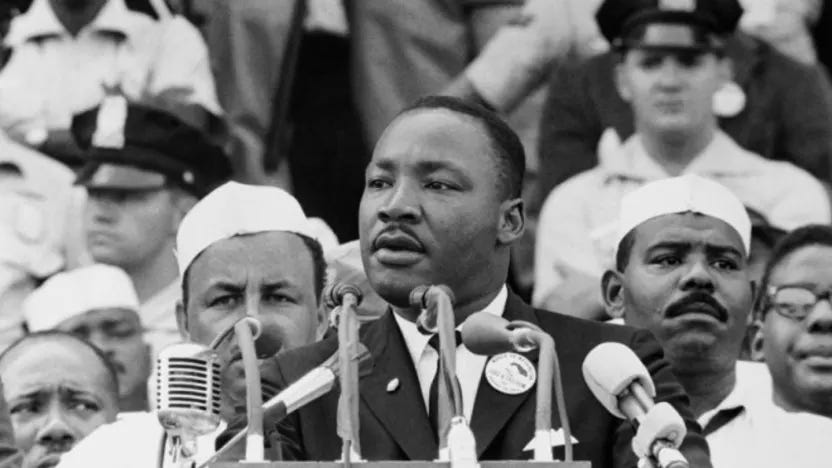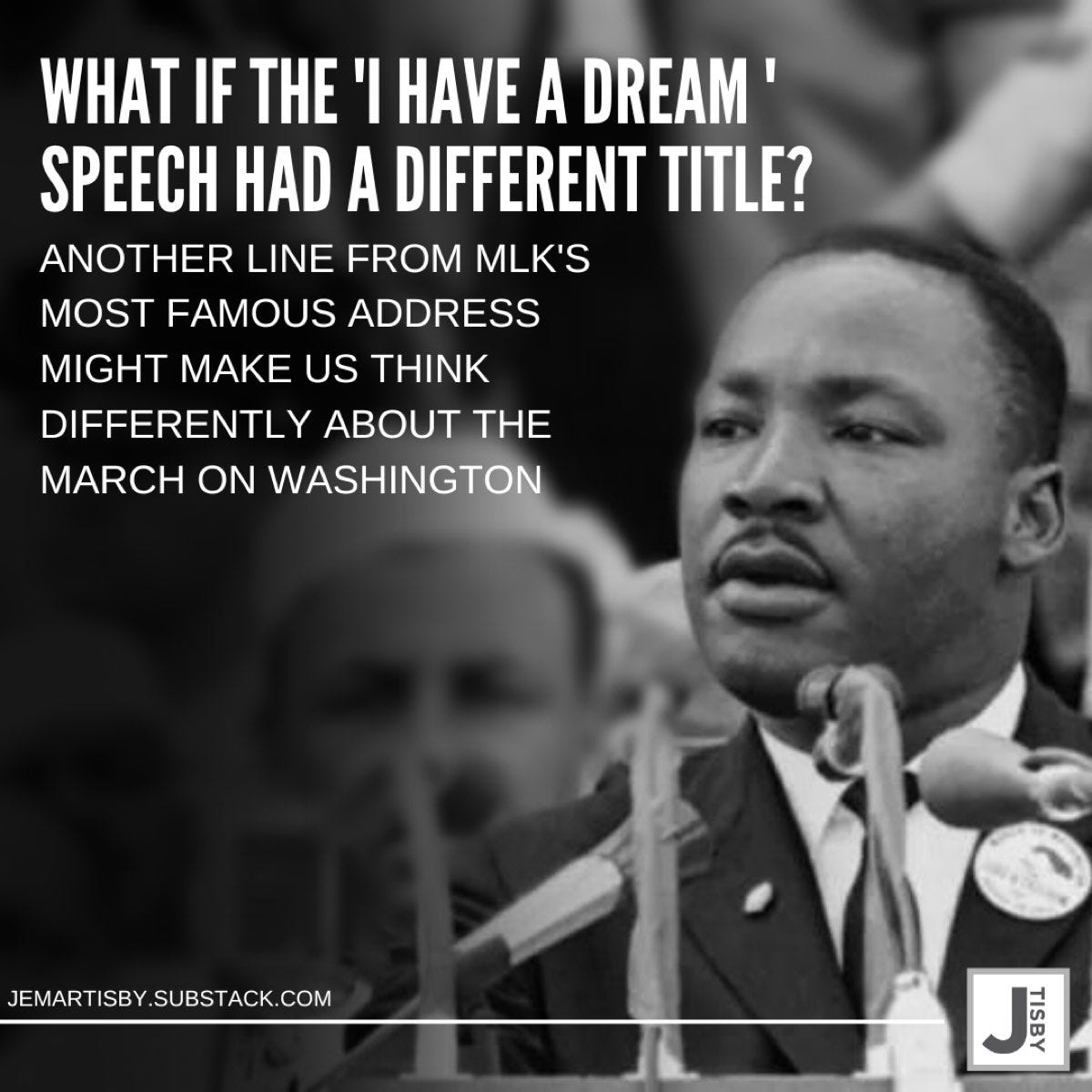What If the "I Have a Dream" Speech Had a Different Title?
Another line from MLK’s most famous address might make us think differently about the March on Washington.
This is the third of a 3-part series commemorating the 60th anniversary of the March on Washington for Jobs and Freedom. If you appreciate historical and reflective content like this, become a paid subscriber today!
On August 28, 1963, exactly 60 years ago, the Reverend Doctor Martin Luther King, Jr. rose to the podium at the March on Washington for Jobs and Freedom and delivered his most famous address—the “I Have a Dream” speech.
He was supposed to speak for just four minutes, an ambitious timeframe for any speaker, especially a Baptist preacher. He ended up speaking for 16 minutes. Although still brief, his words became part of the canon of greatest speeches in the United States.
That speech is most remembered for the words that came near the end…
So even though we face the difficulties of today and tomorrow, I still have a dream. It is a dream deeply rooted in the American dream. I have a dream that one day this nation will rise up and live out the true meaning of its creed: We hold these truths to be self-evident, that all men are created equal.
It bears remembering that MLK borrowed the “I have a dream” phrase (with permission) from a Black woman preacher and activist named Prathia Hall. I write about this in my forthcoming book, The Spirit of Justice (Zondervan Reflective, 2024).
The “I have a dream" phrase resonated so powerfully because it was constructive and visionary. Unlike so many others, King did not simply critique and criticize. He described a picture of possibilities. On the canvas of the future, those words—“I have a dream”—painted a new reality.
Unfortunately, King’s words have often been sanitized and abused as a negative application of colorblindness. In the oft-quoted section below, the radical vision of a new nation based on equality has been used as an excuse to avoid talking about racism or doing anything about it.
I have a dream that my four little children will one day live in a nation where they will not be judged by the color of their skin but by the content of their character. I have a dream today.
Moreover, the dream can also be removed from the confines of chronology and conceived as an idea that either has already come to pass or that will become true “one day”—a day that in the 60 years since he delivered it, has not yet arrived.
But what if the “I Have a Dream” speech had a different title? What if it was remembered for another phrase that King used that day?
Toward the beginning of his speech, King outlined the state of affairs that brought 250,000 marchers to the capital that day.
Despite centuries of protests for equality, King said, “the Negro lives on a lonely island of poverty in the midst of a vast ocean of material prosperity.” And the Black person “still languished in the corners of American society and finds himself in exile in his own land.”
The Declaration of Independence promised that all people were created equal and had the right to “life, liberty, and the pursuit of happiness.”
But, as King explained, “It is obvious today that America has defaulted on this promissory note insofar as her citizens of color are concerned.” The marchers had come that day to “cash this check, a check that will give us upon demand the riches of freedom and the security of justice.”
Then King pressed the issue. He emphasized the need to act immediately.
We have also come to his hallowed spot to remind America of the fierce urgency of now. This is no time to engage in the luxury of cooling off or to take the tranquilizing drug of gradualism.
What if we remembered King’s address at the March on Washington not as the “I Have a Dream” speech but as “The Fierce Urgency of Now” speech?
It was not an accident that the March on Washington for Jobs and Freedom took place in 1963. That year marked 100 years since the Emancipation Proclamation went into effect in 1963.
The Emancipation Proclamation “came as a great beacon light of hope to millions of Negro slaves who had been seared in the flames of withering injustice. It came as a joyous daybreak to end the long night of their captivity.”
But that freedom had not yet arrived for Black people—not in its fullest expressions. In fact, Black people had been terrorized and victimized by the vicious practice of Jim Crow segregation and oppression for decades.
The marchers came there that day to insist upon expeditious change.
Read the protest signs the marchers carried. Emblazoned on many of them was a word that had animated the Civil Rights movement for years—“Now.”
“Freedom Now”, “Voting Rights Now”, “Jobs Now”, “Decent Housing Now”, “An End to Police Brutality Now”
Now, now, now.
To remember King’s words as “The Fierce Urgency of Now”speech highlights the call for instant action. It places the emphasis on making tangible changes, outlined in the 10 Demands of the march, right away.
Too many people today believe the March on Washington was primarily a call for tender sentimentality or positive feelings toward Black people. But the marchers who came by car, train, and plane, who left jobs and family, who risked retribution and recrimination did not come to hear more talking but to demand more doing.
Those words “the fierce urgency of now” insist on movement. They stir a restless civic and human spirit that issues an immediate “cease and desist” on all harm caused by racism.
The urgency of the moment is not tame, it is “fierce.” It grips the heart and hounds the soul. It will not grant peace until justice rolls down like a river.
If we had steeped ourselves in the truth that the nation must respond to “the fierce urgency of now” perhaps we would not still be fighting for many of the same rights that people were fighting for 60 years ago.
It is common, especially in the Black sermonic tradition, to name a speech after its closing lines or refrain. This cements the main theme in the listeners mind and promises to seal it in their psyche.
We need not officially change the title of the “I Have a Dream” speech in our records. But we should remember that another phrase, “the fierce urgency of now” captures a critical idea not only to King, but to all who hunger and thirst for righteousness.
“The fierce urgency of now” helps us remember that delaying justice is a denial of justice.
Read parts 1 & 2
The Speech They Wouldn't Let John Lewis Give during the March on Washington
People Went to the March on Washington to Do More than Hear Some Speeches




![Marchers with signs at the March on Washington, 1963] | Library of Congress Marchers with signs at the March on Washington, 1963] | Library of Congress](https://substackcdn.com/image/fetch/$s_!jaMP!,w_1456,c_limit,f_auto,q_auto:good,fl_progressive:steep/https%3A%2F%2Fsubstack-post-media.s3.amazonaws.com%2Fpublic%2Fimages%2Fa6b28682-8c09-430d-a156-16c0a849faad_1024x717.jpeg)
“A Check Returned for Insufficient Funds”.
I always made clear to students that the famous “I have a dream” line doesn’t show up until the fourth page of the text. Everything before it was a recitation of government bad faith. Then, in true prophetic form, it turns from the extant reality to an imagining of when the injustice had been resolved.
Not a title but “the tranquillizing drug of gradualness” !!!!!